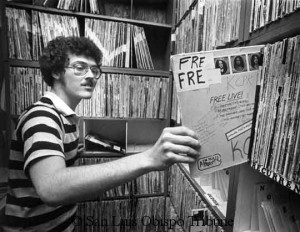In his 1983 Police parody, “King Of Suede,” “Weird” Al Yankovic sang an ode to mom-and-pop stores, to the last time mail-order catalogs and video arcades would matter, to the moment just before the whole world could fit into your pocket, disappear there. It was a sweet, nostalgic and sad song, released on a vinyl album which was sold in record stores and counted down by Casey Kasem. More than three decades later, Yankovic is releasing his latest send-ups as an album, a format that’s largely lost its groove. He’s his own mom-and-pop store now, in danger of closing. From “The Winter of Weird Al,” Steven Hyden’s Grantland piece about the parodist’s precarious place in the new normal, where the 45s and 78s have vanished into the 0s and 1s:
“‘Is the album dead?’ is an old canard that comes up regularly in very thinky think pieces each time another mediocre quarterly sales report is released. But as it pertains specifically to musical parody albums, the format truly does seem to be operating on dial-up speed in a breathless, web-oriented universe. At least the Lonely Island and Tenacious D are known for original material, which makes buying their albums seem sort of worth it. But Weird Al subsists solely on the rapidly staling bread of pop-culture ephemera. He might have benefited from the record-label system for much of his career, but his music was proto-viral back when the Internet was just an idea hypothesized by Weird Al–loving Poindexters.
In the past, Weird Al’s timing was perhaps his greatest asset. Right when the culture seemed to be tiring of a particular song or artist, the Weird Al parody would appear. It was the sign of an artist reaching ‘we love you, but we also can’t stand you’ stardom. But that timing now seems rather, well, sluggish, and this has caused Weird Al to drift back into a crowded field. Now that the release of Mandatory Fun completes Yankovic’s record contract, it seems wise to explore more expedient alternatives.
When I asked Yankovic if it still made sense for him to make albums in the future, he was eager to steer the conversation back to the record he had already made and was trying to promote. But in spite of the hemming and hawing, he was pretty clear about what’s next.
‘I don’t want to draw any hard lines in the sand, because I’d like to leave all my options open, but I’m feeling like this is probably my last conventional album,’ he said.”


